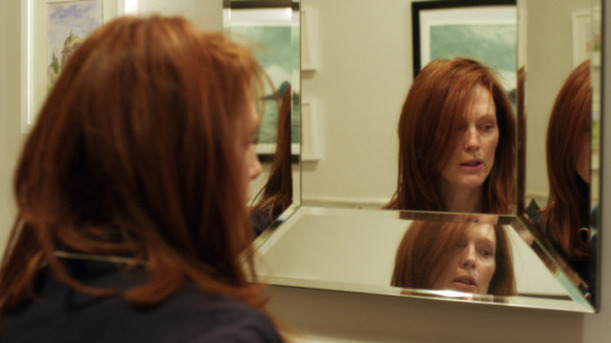Moore’s strengths in this film are apparent from the first scenes, where Alice is celebrating her 50th birthday. Amongst her family, she is intelligent, outspoken, and endlessly lively. Indomitable, Alice carries herself with the crisp authority of a seasoned lecturer. Her unflappable bearing and cool charm cannot help but capture the attention of cast and audience alike. And it’s almost unbearable to watch.
Anyone who saw so much as a trailer for this movie, enters the theatre knowing how it must inevitably end. And, Still Alice takes great advantage of this. The directors do not try to sucker punch the audience with Alice’s diagnosis. Instead the film opens with unabashedly tragic undertones. Even in the midst of Alice’s birthday, relentlessly maudlin background music plays over the festivities. This is a wake for the woman our protagonist once was, the attendees just don’t yet know it. However, the audience does. And, all they can do from their seats of knowledge is watch the tragedy play out.
Moore’s first fifteen minutes onscreen are some of the finest, most concise character establishment I have ever beheld. She has very little time to introduce Alice, much less make her into a character with whom audiences will empathize. Yet, Moore accomplishes this masterfully. Every action Moore makes from solitary jogs, to casual lunches with her children, to even quick games of Words with Friends on her cell phone all serve to quietly demonstrate the brisk intuition and relentless drive which make Alice such a strong protagonist. They form a rich, emotional/intellectual mosaic of everything that will be stripped from the character for the film’s duration.
Alice’s character arc is not one of progress, but of regression. In every subsequent scene, Moore whittles off another tiny piece of the incredible woman we met ever so briefly at the start of the movie. First, her vocabulary trickles away. Then, her normal collectedness disintegrates in fits of manic anguish. Gradually, her skin becomes increasingly pallid, and her eyes grow dimmer. By the end of the movie only a husk remains. And yet, as the title promises, even under the total influence of Alzheimer’s Julianne Moore is undeniably still Alice.
It’s really impossible to overstate the magnitude of this performance. Alice is more than a three-dimensional character. She’s a fully realized individual. Any less of a performance would not be able to carry a picture such as this. In her portrayal of Alice, Julianne Moore manifests a character that remains not only recognizable, but actually relatable, throughout the entirety of her degeneration. From academic titan to gibbering wight, Julianne Moore never seems to portray anyone other than the same character. And she does it by embracing and embodying the one enduring constant in Alice’s life: her beautiful, undeniable humanity.



 RSS Feed
RSS Feed
